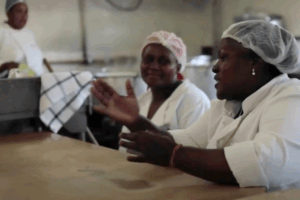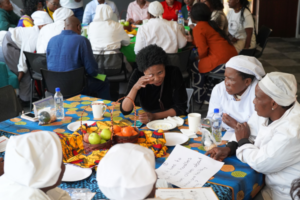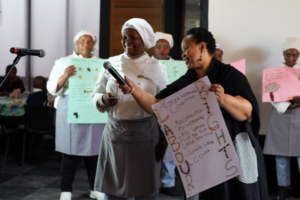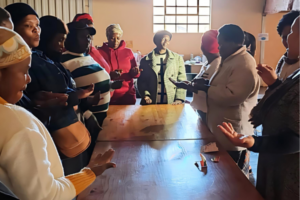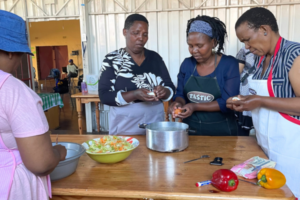National School Nutrition Programme – the basics
The National School Nutrition Programme (NSNP), launched in 1994, has a network of more than 60,000 volunteer food handlers. In turn, that network prepares nutritious meals for over nine million learners at public secondary and primary schools in South Africa’s most impoverished communities. Along with the School Governing Body (SGB), the volunteer food handlers ensure the NSNP runs smoothly.
The NSNP is funded through a grant framework and directed by Department of Basic Education. Schools are required to set up School Nutrition Committees responsible for proper menus, health and safety and monitoring and evaluation. The committee comprises nutrition advisers, SGB members, a school coordinator and a volunteer food handler.
The NSNP is one of the government’s most effective interventions for poverty alleviation. The programme has impressive scope. It addresses hunger and malnutrition and improves the ability of children to learn and attend school. The NSNP is community-centred. Children and their parents learn how to have a healthy lifestyle and grow food. Also, it provides income to unemployed members of the community and many local small businesses.
Volunteer food handlers – Who are they? How are they appointed? What is the work?
The School Governing Body (SGB) appoints volunteer food handlers to prepare food, serve the children and clean the kitchens and utensils.
Food handlers are unemployed members of the community and mostly women with children in the school.
Due to rising joblessness, more young women (many of them have a matric certificate or college diploma) seek this job. Volunteer food handlers were initially older women who viewed the work of cooking for learners as a ‘labour of love’ rather than a remunerated job. The job of a NSNP volunteer food handler is hotly-contested in the community, with many unemployed mothers of learners on the waiting list.
The position of the NSNP school coordinator is prestigious and powerful. The coordinators are teachers and very strategic partners in the NSNP. A school coordinator oversees the day-to-day operations and manages the recruiting of food handlers and gardeners.
A coordinator in a large school can get over 600 applications for just eight vacancies for volunteer food handlers. From the pool of applicants, the coordinators often recommend the qualified young women for jobs in other programmes like aftercare and teaching assistant. The NSNP is thus an avenue for different kinds of work opportunities for community members.
Conditions of work
Volunteer food handlers sign a three-year employment contract, which stipulates the duties, responsibilities, hours of work and the payment amount. The payment is a stipend of R1 270 and one social protection benefit – the Unemployment Insurance Fund.
One volunteer food handler is appointed for every 200 learners. Large schools have up to eight food handlers. In small schools, the ratio of food handlers to learners can be 1:125.
The recruits get training on the menu, food safety, good hygiene, good nutrition, occupational health safety and handling inventory.
The employment contract offers very little job security. Food handlers face many challenges at the workplace:
- They can be replaced before the contract lapses if the SGB yields to pressure from waiting candidates
- They are not entitled to family responsibility leave, sick leave, compassionate leave, medical aid, provident fund and maternity leave. To take leave, a food handler must make arrangements for a substitute.
- They face intimidation, harassment and even violence from learners and members of the broader community.
- The workplace is extremely hot and often poorly ventilated. Yet food handlers don’t have proper protective clothing. Also, carrying heavy pots with minimal help puts the workers at risk of injuries and debilitating medical conditions
- Kitchens are under-resourced, small and not equipped to cook for over 600 children every day.
Future of the volunteer food handler job
The demand for the volunteer food handler job will continue to increase as long as the NSNP and the runaway unemployment remain. In the context of the rising precariousness and informality in employment, more people will view the volunteer food handler job as not a service but a job.
How the Labour Research Service (LRS) is responding
We have built relationships with volunteer food handlers in four communities in Gauteng Province and produced a baseline study. The study showed the concerns, fears and aspirations of volunteer food handlers.
We create safe spaces for volunteer food handlers to express themselves and learn from each other without the fear of losing the very precarious work they are dependent on. We focus on the passions of the food handlers, be it nutrition or cooking. Through discussing issues close to their hearts, volunteer food handlers will see and articulate the important role they have in the NSNP and the school community. LRS believes in strengthening the ‘voice’ in any process of self-organising to claim rights.
We have also connected with women community leaders who are interested in supporting the volunteer food handlers to achieve decent work.
To create visibility, respect and recognition for this work, we will engage with relevant role players, including trade unions and civil society organisations. We will use peer learning spaces to create joint campaigns and advocacy for decent work for volunteer food handlers.
Power Up! initiative offers us the opportunity to:
- know more about what it means to advocate for the reproductive work mainly done by women and to have the work valued and respected.
- advocate for decent work for a very significant but marginalised group of workers in society.
- deepen reflection on our approaches and strategies in the Power Up! consortium, and learn from organisations experiencing similar challenges.
A day in the life of Volunteer Food Handler
Volunteer Food Handlers are the hands and heart of the National School Nutrition Programme. The work of feeding millions of learners must be seen as work deserving of recognition, value and appropriate working conditions and salary.




